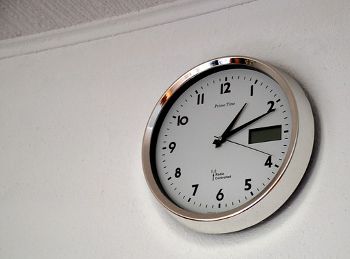A preposition of place is a word which helps to describe where something or somebody is. A preposition of place describes the location of something.
There are many prepositions of place in the English language and each of them has several uses.
In this lesson, we will study 3 prepositions of place:
- at
- in
- on
at
Specific point or place
We can use “at” to describe a very specific point or place. Examples:
There is a dog at the top of the steps.

There is a woman at the bottom of the steps.
The postman is at the door.
There is a supermarket at the end of the street.
An exact address
An exact address is an address with the name of the street and also the number of the street. Example:
Mark lives at 55 Oxford Street.
If we do not know the exact address. If we only know the name of the street, then we use “on” as the preposition:
Mark lives on Oxford Street.
Events
We use the preposition “at” to describe being present at an event. Examples:
I was at a party last night.
Where is David?
He is at a concert.

Buildings where an event or activity takes place
We use “at” if somebody has gone to a building, and we want to describe generally and roughly where the person is. When we use “at” in this context it is not important if the person is currently inside the building or outside the building. We are simply describing where the person has gone. It is not specific. Examples:
Mark: Hello David. Is Jane here?
David: Jane isn’t here. She’s at the library with her friends.

David is saying that Jane has gone to the library. It is a general statement of where Jane is. Maybe Jane is inside the library building or maybe she is outside the library building waiting. He doesn’t know and it isn’t important.
If we want to be very specific about a building, then we use the preposition of place “in” to say that the person has entered the building. Example:
(Mark goes to the library to look for Jane. He sees a friend of Jane’s called Sarah in front of the library .)
Mark: Hello Sarah. Have you seen Jane? Where is she?
Sarah: Hi Mark. Yes, she is in the library.
Conclusion, for buildings, we use “at” for a general description of where somebody has gone and we use “in” to specifically say the person is inside the building.
A stop on a journey
We stopped at a small village.
The train from Manchester to London stops at Birmingham.
in
Enclosed space / a large place with boundaries
We use the preposition “in” for an enclosed space or a place which is surrounded by boundaries. Examples:
The dog is in the garden.

I have an apple in my bag.
David’s car is in the car park.
Let’s go for a walk in the forest.
Towns or cities
A very common use of the preposition “in” is for towns and cities. In english, we do NOT use “at” for towns and cities:
I was born in Manchester. ![]()
Jane lives in London. ![]()
Jane lives at London. ![]()
Where is Mark?
He’s in Birmingham today.
on
For a surface
The preposition “on” is often used to describe a surface. Examples:
There’s a clock on the wall.

What’s that on the ceiling?
There’s a bag on the floor.
My books are on the table.
Attached to
If something is physically attached or joined to something else, then we use the preposition “on”. Example:
She is wearing a ring on her finger.
Close to a river
If something is directly next to a river, then we use the preposition “on”:
London is on the River Thames.

My house is on the River Avon.


NataliP says
Thank you for the lesson. Very accessible and understandable.
Mark says
Why do we say I live on an island, not in an island, or I live on the mainland not in the mainland, i
Live on the moon not in the moon
I live in Canada not on Canada?
Eli says
Because as surrounded by water, as the example when a place is close to a river we use On
245soso says
so…….
Eman says
thank you very much Andrew ,you are a good teacher, I mean a good person
Dinesh says
You are good coath for anyone who learn eng.
ali mohamed says
thank you from this lesson i undestand very good
... says
very well not good 😐
ali mohamed says
nice to undestant this lesson
Feinkstat says
I have a problem how to describe task 1 writing in academic.
Anila Imran says
Hi
Mr. Andrew
All the excellent lessons I heard here.
You are the best resource of learning.
CATERINA says
THANK YOU FOR THE LESSON. IT HAS BEEN VERY CLEAR WITH ITS SO MANY EXAMPLES. BESIDES THE EXAMPLES, THE LISTENING EXERCISE HAS BEEN VERY USEFUL TO IMPROVE MY PRONUNCIATION AND COMPREHENSION.
CATERINA
anna says
Hallo Andrew,
Very nice lesson but could you speak a little bit faster?
Do you have any exercises to practise prepositions?
Kind regards,
Anna
Alexandre Ramos says
Dear Sir
I’ m from Portugal. I’m trying to learn English, but I’ m in the “confusion stage”.
I have several English grammars. They say the correct form in British English is: “I live in XXX Street”.
In another book we can read:
“For specifying the position of something relative to a street, British generally uses in, and American on. When the street in question is noted as a shopping location, British uses on or in. Thus, CIC has approximately equal numbers of British in the High Street and on the High Street, but no instances of American in Main Street, only on Main Street.” (John Algeo, British or American English?, Cambridge University Press, 2006, p. 172)
What do you think about it?
Miguel says
I think that Crown academy of english is good
Joachim Olbrich says
The prepositions : in, on, at, for me, caused a lot of problems in (?) my past,
No person could explain as exactly the right use of those terms as you did.
As German, confusions are nothing out of the ordinary here among our nativ
languish and your one one. I only hope my phrases are not as bad, to make a fool of myselve. Thanks a lot for (?) Your excellent informationes, which are
very helpful, as I think not only for me. Remain well and take my highest respect teaching us.
Joachim Olbrich.
Riham says
You are really wonderful. Your method is precise and pretty clear. How could I buy your English grammar lessons? Is there a book?
Sachin Kaushik says
Sir,
I`ve watched your video, it is quite informative and i`ve few doubts which i hope you`d clear.
It is said :
in the ship,
in the car,
in the truck
but why
on the bus,
on the plane,
on the motor bike.
How to know when to know when to use in or on for motor vehicle.
Mick Warwick says
Hello Sachin,
Firstly, we don’t say ‘in the ship’; we say ‘on the ship’.
With modes of transport the difference between using ‘in’ or ‘on’ is due to historical or usage reasons. For example…
We are physically ‘inside’ a car or truck (a truck’s cab), so we use ‘in’. We would say to a passenger, for example, ‘Come on – get into the car.’
We are not inside a motorbike (or a bicycle or horse or chair or table). We sit on (on top of) these things. So we use ‘on’.
As for ship, bus and plane – these are types of mass transport. The ship is the oldest form of mass transport, and early ships were made of wood. The side of a ship was known as ‘the board’; the decks were made of ‘boards’ (planks); and you would also use a loose board (a plank) to get ONTO the deck – just as you would get ONTO a table.) The historical term (16th century) for this manoeuvre was therefore ‘to board the ship’, which means ‘to get onto’ – not ‘to get into’. In the 19th c. this terminology was adopted for new types of mass transport – buses, trains, aeroplanes etc. So we say we are ‘on the bus’ (or we are ‘on board the bus’ or ‘aboard the bus’.)
Just to confuse matters, ships are often referred to as ‘boats’, but we still say. ‘I’m on the boat’ because we’re talking about a large mass transport vessel (with a deck).
‘Boat’ is also used to mean a very small vessel – a rowing boat for example. Since these are small, and with a hollow shape, we usually step INTO them. So we would say we are ‘in the boat.’ (We use this for other things of similar shape; ‘in the canoe’, ‘in the bath’. We don’t say ‘on the canoe’ or ‘on the bath’.)
Hope this helps.
Mick
aline marceshini says
I tihink this site is very usefull to learn english!
aline marchesini Pinto says
This is a great site to learn english and improve the vocabulary
Umesh Sharma says
Andrew, I have come across your lessons on English Grammar and have enjoyed every one of the. They are excellent , well done . thanks a lot
MELBAN says
THANKS A LOT. YOUR TEACHING IS VERY SIMPLE AND EFFECTIVE
Aksiniya says
Hello)) What about if I say “I study at London”. So I meant here ‘the University of London’. Is it correct?
I’ve seen that rule on a site.
Thanks in advance =)
Nadeem says
Thank u so much Sir,, it was very helpful
monika says
Is the paving stone IN the street or ON the street? Both are used and both feel correct. I would love a grammar rule I can count on to help me choose the truly correct preposition in situations similar to this one….Does the verb dictate the preposition, or do i look to the noun?
Mansoor Ali says
Good explanation with good example..
Elena says
Thanks you for the lesson. I’m reviewIng English grammar . I’ve forfotten many things, so I, ve started since the basis. I ‘d like to speak quicker. I really like the lesson.
Gloria says
This is really enlightening and good. Thanks so much.
It’s site I would like to be visiting to improve on my English.
You re doing a great job. Thanks once again for the explanations.
Makes it simple and clear.
Ruth says
What is correct to use “in” or “on” when we say:
Meet you in high street OR Meet you on high street?
Eriza says
Do you say “When I was in Taj Mahal” or “When I was at Taj Mahal” I’m still confused about preposition place for famous places.